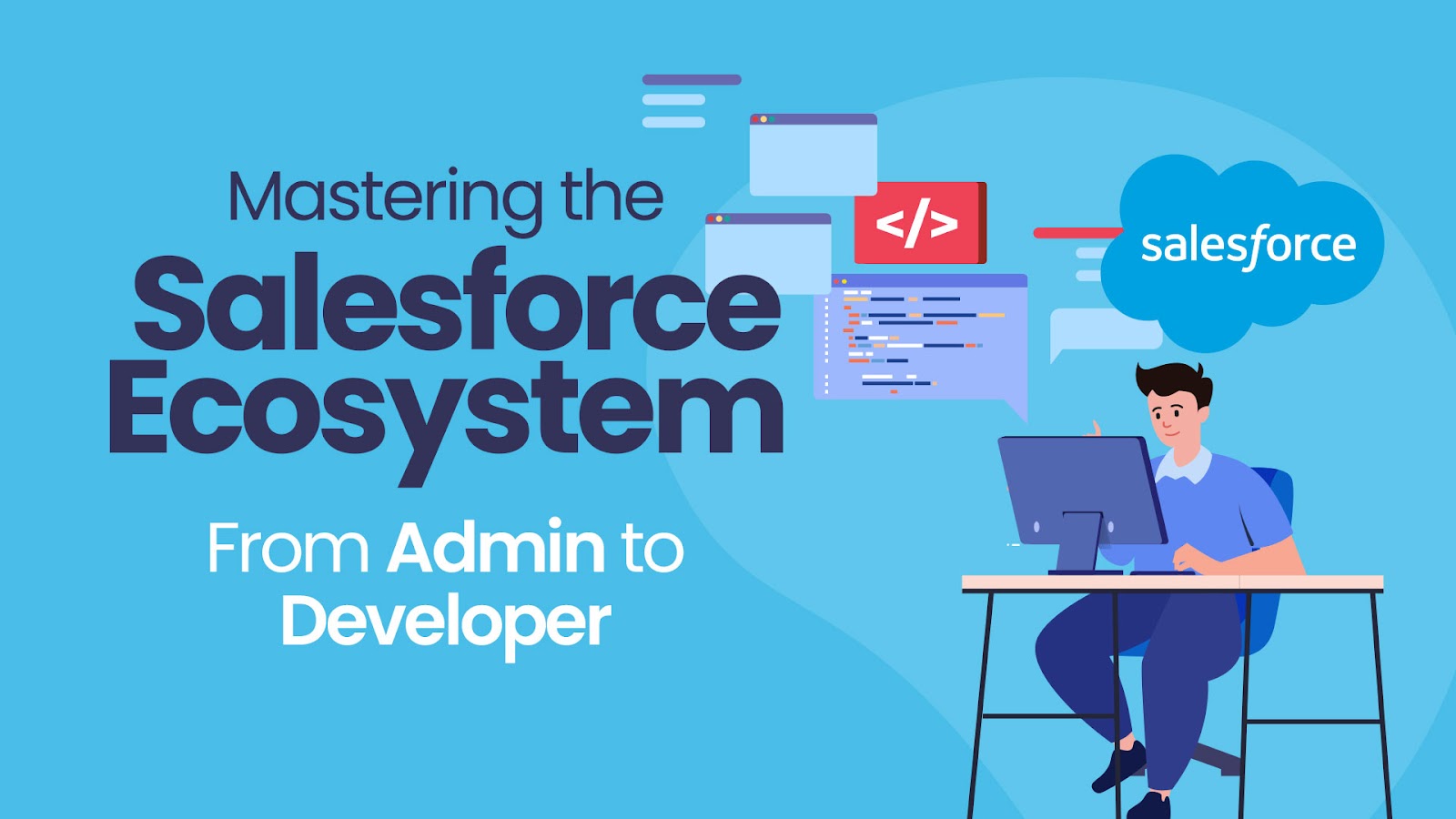Welcome to the world of Salesforce! Whether you’re just starting or you’re looking to advance your abilities, knowing the Salesforce ecosystem can lead to intriguing opportunities. From being a Salesforce admin who configures and customizes Salesforce to becoming a full-fledged Salesforce developer building powerful applications, there’s a path for everyone.
In this blog, we’ll look at how you may explore and excel in the Salesforce ecosystem, from the perspective of someone who has been there.
What is Salesforce?
Salesforce is a leading cloud-based customer relationship management (CRM) platform that revolutionizes how businesses engage with their customers. Salesforce is basically a consolidated platform for handling customer information, sales processes, marketing campaigns, and customer support interactions. Salesforce stands out for its scalability, flexibility, and user-friendly design, making it ideal for businesses of all sizes and industries.
Why is Salesforce important?
The value that Salesforce offers businesses is in its ability to help them improve communication, streamline operations, and eventually lead to growth and customer happiness. Salesforce is an essential tool in today’s competitive business market because it offers a variety of tools and solutions that can be customized to your specific requirements.
Salesforce Administrator: Learn about the role of an admin and their responsibilities
A Salesforce Administrator is essential to ensuring that a Salesforce instance runs smoothly. They are in charge of configuring and modifying Salesforce to match their organization’s specific requirements. This includes setting up custom objects and fields, implementing workflows and automation processes, and generating reports and dashboards for data analysis.
In addition to their technical responsibilities, they usually serve as liaisons between technical teams and business stakeholders, translating business requirements into Salesforce solutions that can be deployed. Essentially, the foundation of any effectively implemented Salesforce system is its Salesforce Administrators, who stimulate productivity, creativity, and efficiency throughout the entire company.
Learning the Basics of Salesforce Administration
Mastering Salesforce Administration is a journey that begins with Learning the Basics. This involves being aware of the core principles and attributes of Salesforce in addition to the variety of tools and resources it provides. As you progress, you’ll learn about more advanced topics such as customization, automation, and integration, developing the skills and knowledge needed to successfully manage a Salesforce installation.
- Navigating the Setup Menu
It is a crucial component in Salesforce management. Using the Setup Menu, you can centrally control the Salesforce configuration and customization process based on your company’s unique needs. The Setup Menu offers a multitude of choices for creating new objects, fields, workflows, and automation, allowing you to tailor Salesforce to your specific requirements.
- Data Management
Data management is another critical component of Salesforce administration. Salesforce’s data import, export, and change capabilities assure data accuracy, consistency, and dependability. Effective data management techniques are essential to maintaining the integrity of your Salesforce database and optimizing its value to your business.
- Security and Access Control
Security and access control are critical considerations in Salesforce administration. Administrators are responsible for implementing security protocols, supervising them, safeguarding confidential information, and ensuring that they comply with legal mandates. Restrict access to various Salesforce services and features by setting up user permissions, defining roles and profiles, and establishing security settings. Salesforce Administrators may assist retain stakeholder trust and protect their organization’s data by knowing and executing comprehensive security protocols.
Customization and Configuration
Salesforce’s customization and configuration features enable businesses to adapt the platform to their unique needs, increasing efficiency and productivity.
- Custom Objects and Fields
This facilitates improved information organization and management within Salesforce by allowing users to design additional fields and data structures specific to their business operations.
- Workflow Automation
It is another powerful tool for streamlining processes and increasing productivity. Users can automate business processes and repetitive operations with workflows and Process Builder to minimize errors and human labour. Admins can automate processes like sending emails, updating records, and starting tasks based on specified rules by setting criteria and actions.
- Reports and Dashboards
When it comes to giving Salesforce users insights into data and performance, reports and dashboards are essential. Dashboards offer a visual depiction of critical information in real time, while users may generate specific reports to analyze data and track key indicators. Organizations can monitor progress toward their objectives, spot patterns, and make well-informed decisions by utilizing reports and dashboards.
Transitioning to Salesforce Development
Transitioning to Salesforce Development marks a significant step in leveraging the platform’s capabilities to build custom solutions tailored to specific business needs.
Understanding Apex and Visualforce
This requires you to become acquainted with Salesforce’s markup language, Visualforce, and programming language, Apex. While Visualforce allows Salesforce developers to design custom Salesforce user interfaces, Apex allows them to create unique business logic and functions.
Introduction to Lightning Web Components
Introduction to Lightning Web Components introduces Salesforce developers to a modern development framework for building responsive web applications on the Salesforce platform. Using online standards like HTML and JavaScript, Lightning online components are a quick and easy way to create rich user experiences.
Apex Triggers and Classes
Triggers enable Salesforce developers to execute custom logic before or after records are inserted, updated, or deleted, while Classes allow for the encapsulation of reusable code and business logic.
Integration with External Systems
Salesforce has to be integrated with other systems and services. Salesforce Developers can achieve smooth interoperability and data synchronization between Salesforce and other systems by transferring data and functionality using APIs (Application Programming Interfaces).
Test-Driven Development
Test-driven development emphasizes the importance of testing in the development process. By building effective test classes, developers may assure the dependability and robustness of their code, finding and addressing bugs early in the development process. Test-driven development encourages a methodical approach to developing high-quality solutions for the Salesforce platform.
Specializing and Advancing Your Career with Salesforce Certifications
Specializing and Advancing Your Career with Salesforce Certifications is a strategic move for professionals looking to demonstrate their expertise and advance in the Salesforce ecosystem.
Choosing the Right Certification
Choosing the Right Certification is the first step toward reaching your professional objectives. Salesforce offers certifications for a range of jobs and skill levels, including Administrator, Developer, Architect, and Consultant tracks. By researching the various credentials and understanding their requirements and objectives, you may choose the one that best matches your career goals and interests.
Preparing for Certification Exams
It requires thorough preparation and planning. Numerous tools are available to help you prepare, including study guides, mock exams, online forums, and official Salesforce training materials. By allocating time for review of exam subjects, practice questions, and study groups, you can get the confidence and knowledge needed to pass your Salesforce certification exam and validate your skills and knowledge within the Salesforce ecosystem.
Networking and Community Involvement
- Joining Salesforce Community Groups
Salesforce Community Groups allow you to connect with professionals who share your interests, exchange best practices, and learn from others’ experiences. These organizations foster community and collaboration by hosting frequent events, webinars, and talks on Salesforce-related topics.
- Attending Events and Conferences
Attending conferences and events can help you network with new people and learn about the latest developments in the Salesforce ecosystem. Attending events like Dreamforce and regional Salesforce community gatherings allows one to network with industry professionals, take part in workshops and training sessions, and learn about cutting-edge technologies and best practices.
- Keeping Up with New Releases
Keeping up with the latest updates is essential because the Salesforce platform is always evolving. Salesforce often adds new features, functions, and enhancements to its product lines. Staying current with these upgrades allows you to increase productivity, stay ahead of Salesforce advancements, and take advantage of new capabilities.
- Exploring Advanced Topics
By studying advanced topics, you may find out more about specialized areas of the Salesforce ecosystem, like Salesforce DX and Einstein AI. By pursuing these cutting-edge fields, you can broaden your skill set, learn new technology, and set yourself apart in the competitive job market. Whether through self-study, online courses, or hands-on projects, diving into advanced topics can unlock new opportunities and propel your career forward.
Conclusion
This career offers tremendous opportunities for fulfilment along with hurdles. Whatever your background—you may have started as an administrator or you may be trying to advance—remember that learning and practical experience are crucial companions on your path. So let’s get off on this exciting adventure with a strong resolve to study. Numerous choices exist, so let’s seize the opportunity to go on this exciting journey!

Rachna Namjoshi is an SEO Executive who works with TechForce Academy. She combines proven strategies and an innovative approach to content to bring out the best in SEO. Rachna’s strong passion for growth and learning motivates her to constantly keep up with new technologies and processes.
